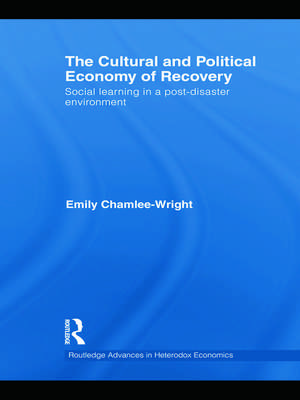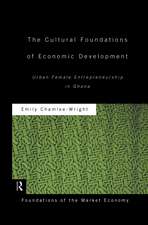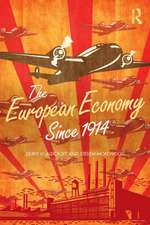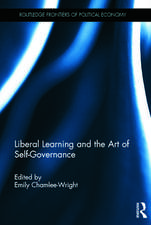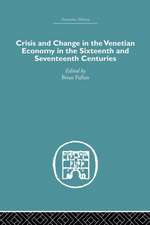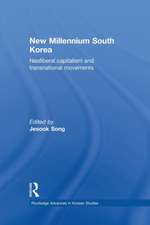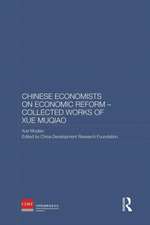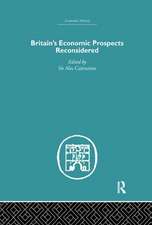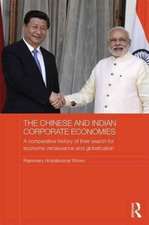The Cultural and Political Economy of Recovery: Social Learning in a post-disaster environment: Routledge Advances in Heterodox Economics
Autor Emily Chamlee-Wrighten Limba Engleză Hardback – 18 feb 2010
Professor Chamlee-Wright investigates not only the nature of post-disaster recovery, but the nature of the social order itself – how societies are able to achieve a level of complex social coordination that far exceeds our ability to design. By deploying the tools of both political economy and cultural economy, the book contributes to the bourgeoning literature on the social, political and economic impact of Hurricane Katrina.
Through a selection of case studies, the author argues that post-disaster resilience depends crucially upon the discovery that unfolds within commercial and civil society. The book will be of particular interest to postgraduate students and researchers in economics, sociology and anthropology as well as disaster specialists.
| Toate formatele și edițiile | Preț | Express |
|---|---|---|
| Paperback (1) | 478.04 lei 6-8 săpt. | |
| Taylor & Francis – 11 noi 2013 | 478.04 lei 6-8 săpt. | |
| Hardback (1) | 1057.13 lei 6-8 săpt. | |
| Taylor & Francis – 18 feb 2010 | 1057.13 lei 6-8 săpt. |
Din seria Routledge Advances in Heterodox Economics
-
 Preț: 288.57 lei
Preț: 288.57 lei -
 Preț: 379.30 lei
Preț: 379.30 lei - 30%
 Preț: 849.29 lei
Preț: 849.29 lei - 18%
 Preț: 1058.69 lei
Preț: 1058.69 lei - 18%
 Preț: 1173.97 lei
Preț: 1173.97 lei -
 Preț: 449.41 lei
Preț: 449.41 lei - 18%
 Preț: 1052.35 lei
Preț: 1052.35 lei - 25%
 Preț: 767.88 lei
Preț: 767.88 lei - 15%
 Preț: 267.20 lei
Preț: 267.20 lei - 18%
 Preț: 1171.54 lei
Preț: 1171.54 lei - 18%
 Preț: 1061.84 lei
Preț: 1061.84 lei -
 Preț: 482.62 lei
Preț: 482.62 lei - 18%
 Preț: 1062.79 lei
Preț: 1062.79 lei - 31%
 Preț: 765.01 lei
Preț: 765.01 lei - 15%
 Preț: 460.56 lei
Preț: 460.56 lei - 31%
 Preț: 762.57 lei
Preț: 762.57 lei -
 Preț: 484.47 lei
Preț: 484.47 lei - 16%
 Preț: 299.25 lei
Preț: 299.25 lei -
 Preț: 467.82 lei
Preț: 467.82 lei - 28%
 Preț: 847.31 lei
Preț: 847.31 lei -
 Preț: 410.46 lei
Preț: 410.46 lei - 15%
 Preț: 423.60 lei
Preț: 423.60 lei -
 Preț: 492.96 lei
Preț: 492.96 lei - 18%
 Preț: 1050.02 lei
Preț: 1050.02 lei - 12%
 Preț: 325.34 lei
Preț: 325.34 lei - 18%
 Preț: 1055.51 lei
Preț: 1055.51 lei - 25%
 Preț: 571.41 lei
Preț: 571.41 lei -
 Preț: 409.69 lei
Preț: 409.69 lei - 18%
 Preț: 1064.01 lei
Preț: 1064.01 lei - 30%
 Preț: 848.15 lei
Preț: 848.15 lei -
 Preț: 486.80 lei
Preț: 486.80 lei - 18%
 Preț: 699.96 lei
Preț: 699.96 lei - 18%
 Preț: 1061.06 lei
Preț: 1061.06 lei - 28%
 Preț: 821.53 lei
Preț: 821.53 lei - 18%
 Preț: 1055.32 lei
Preț: 1055.32 lei
Preț: 1057.13 lei
Preț vechi: 1289.18 lei
-18% Nou
Puncte Express: 1586
Preț estimativ în valută:
202.30€ • 219.67$ • 169.94£
202.30€ • 219.67$ • 169.94£
Carte tipărită la comandă
Livrare economică 22 aprilie-06 mai
Preluare comenzi: 021 569.72.76
Specificații
ISBN-13: 9780415778046
ISBN-10: 0415778042
Pagini: 240
Ilustrații: 6 b/w images, 9 tables and 6 line drawings
Dimensiuni: 156 x 234 x 23 mm
Greutate: 0.52 kg
Ediția:1
Editura: Taylor & Francis
Colecția Routledge
Seria Routledge Advances in Heterodox Economics
Locul publicării:Oxford, United Kingdom
ISBN-10: 0415778042
Pagini: 240
Ilustrații: 6 b/w images, 9 tables and 6 line drawings
Dimensiuni: 156 x 234 x 23 mm
Greutate: 0.52 kg
Ediția:1
Editura: Taylor & Francis
Colecția Routledge
Seria Routledge Advances in Heterodox Economics
Locul publicării:Oxford, United Kingdom
Public țintă
Postgraduate and UndergraduateCuprins
Introduction: Understanding the Sources of Resilience Part I: Theoretical Frame and Methodology 1. The Nature and Causes of Social Order as Seen Through Post-Disaster Recovery 2. Qualitative Methods and the Pursuit of Economic Understanding Part II: Deploying Socially Embedded Resources in a Post-Disaster Context 3. Collective Action in the Wake of Disaster: Social Capital Rebuilding Strategies of Early Returnees 4. Social Capital, Community Narratives, and Recovery Within a Vietnamese-American Neighborhood 5. Collective Narratives and Entrepreneurial Discovery in St. Bernard Parish 6. Negotiating Structure and Agency in the Ninth Ward: Sense of Place and Divine Purpose in Post Disaster Recovery Part III: Political -Economy and Social Learning in Non-Priced Environments 7. The Deleterious Effects of Signal Noise in Post-Disaster Recovery 8. Expectations Anchoring and the Civil Society Vacuum: Lessons for Public Policy 9. Concluding Remarks Part IV: Appendices Appendix A: Demographic Summaries of Research Subjects in Neighborhoods of Interest Appendix B: Sample Interview Guide Appendix C: Primary and Secondary Theme Codes
Recenzii
'Emily Chamlee Wright has made a major contribution to understanding the response to Hurricane Katrina. Her book is a case study of the importance of spontaneously-evolved institutions in solving post-disaster collective action problems. She shows that micro social networks are often more important for recovery than large government programs.'
- Mario J. Rizzo, New York University, USA
'In her pioneering work Chamlee-Wright has used a natural experiment in governmental failure to show that an economy is more than a machine to be run by our masters. It is a social order, "embedded," as the sociologists say, in ethics. She shows that such fully human actors are creative, as a Samuelsonian Max U-er is not. We are all entrepreneurs, big or small. The fact requires an empirical yet Austrian economics, of which Chamlee-Wright's book is a sterling example'.
- Deirdre McCloskey, University of Illinois at Chicago, USA.
'F. A. Hayek famously eschewed the term economy for its constructivist connotations. Emily Chamlee-Wright profitably reclaims it, recasting economy as a plurality of self-organizing processes, civic and cultural as well as commercial. As a work of theory and as an ethnographic investigation of post-Katrina recovery, Chamlee-Wright’s book is a bold act of intellectual entrepreneurship – signaling the explanatory possibilities of a scientifically serious hermeneutic economics.'
- Robert Garnett, Texas Christian University, USA.
- Mario J. Rizzo, New York University, USA
'In her pioneering work Chamlee-Wright has used a natural experiment in governmental failure to show that an economy is more than a machine to be run by our masters. It is a social order, "embedded," as the sociologists say, in ethics. She shows that such fully human actors are creative, as a Samuelsonian Max U-er is not. We are all entrepreneurs, big or small. The fact requires an empirical yet Austrian economics, of which Chamlee-Wright's book is a sterling example'.
- Deirdre McCloskey, University of Illinois at Chicago, USA.
'F. A. Hayek famously eschewed the term economy for its constructivist connotations. Emily Chamlee-Wright profitably reclaims it, recasting economy as a plurality of self-organizing processes, civic and cultural as well as commercial. As a work of theory and as an ethnographic investigation of post-Katrina recovery, Chamlee-Wright’s book is a bold act of intellectual entrepreneurship – signaling the explanatory possibilities of a scientifically serious hermeneutic economics.'
- Robert Garnett, Texas Christian University, USA.
Descriere
How do societies achieve a level of complexity, coordination, and social intelligence that far surpasses the capacity of individual human intelligence? Emily Chamlee-Wright addresses this question in the context of civil society generally, in which we cannot always rely on market prices to guide our way.
